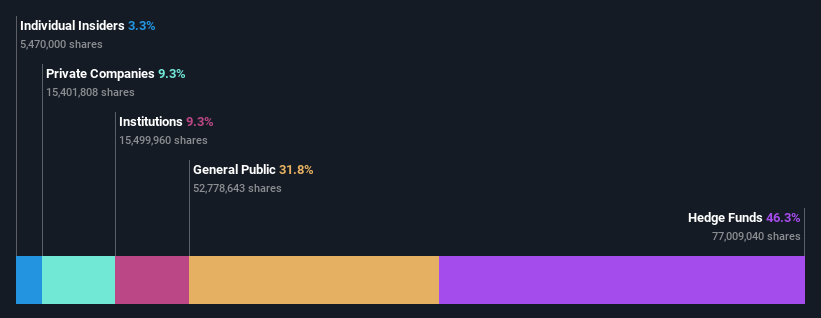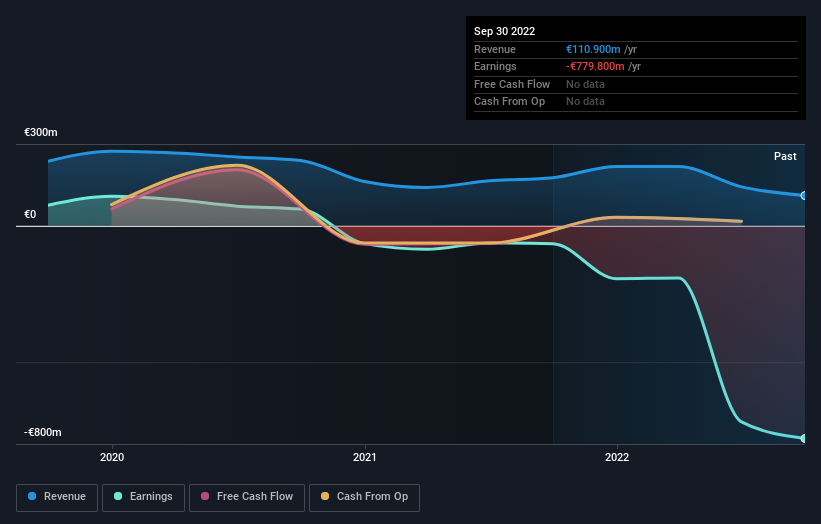CORESTATE Capital Holding S.A.'s (ETR:CCAP) large hedge funds owners must be happy as stock continues to impress, up 24% over the past week
Key Insights
Institutions' substantial holdings in CORESTATE Capital Holding implies that they have significant influence over the company's share price
56% of the business is held by the top 6 shareholders
Using data from company's past performance alongside ownership research, one can better assess the future performance of a company
If you want to know who really controls CORESTATE Capital Holding S.A. (ETR:CCAP), then you'll have to look at the makeup of its share registry. With 46% stake, hedge funds possess the maximum shares in the company. In other words, the group stands to gain the most (or lose the most) from their investment into the company.
And last week, hedge funds investors ended up benefitting the most after the company hit €99m in market cap. The one-year return on investment is currently 47% and last week's gain would have been more than welcomed.
Let's delve deeper into each type of owner of CORESTATE Capital Holding, beginning with the chart below.
See our latest analysis for CORESTATE Capital Holding
What Does The Institutional Ownership Tell Us About CORESTATE Capital Holding?
Institutional investors commonly compare their own returns to the returns of a commonly followed index. So they generally do consider buying larger companies that are included in the relevant benchmark index.
As you can see, institutional investors have a fair amount of stake in CORESTATE Capital Holding. This suggests some credibility amongst professional investors. But we can't rely on that fact alone since institutions make bad investments sometimes, just like everyone does. It is not uncommon to see a big share price drop if two large institutional investors try to sell out of a stock at the same time. So it is worth checking the past earnings trajectory of CORESTATE Capital Holding, (below). Of course, keep in mind that there are other factors to consider, too.
It looks like hedge funds own 46% of CORESTATE Capital Holding shares. That's interesting, because hedge funds can be quite active and activist. Many look for medium term catalysts that will drive the share price higher. Pacific Investment Management Company LLC is currently the largest shareholder, with 9.3% of shares outstanding. The second and third largest shareholders are Nut Tree Capital Management, LP and Whitefort Capital Management, LP, with an equal amount of shares to their name at 9.3%.
We did some more digging and found that 6 of the top shareholders account for roughly 56% of the register, implying that along with larger shareholders, there are a few smaller shareholders, thereby balancing out each others interests somewhat.
While studying institutional ownership for a company can add value to your research, it is also a good practice to research analyst recommendations to get a deeper understand of a stock's expected performance. We're not picking up on any analyst coverage of the stock at the moment, so the company is unlikely to be widely held.
Insider Ownership Of CORESTATE Capital Holding
While the precise definition of an insider can be subjective, almost everyone considers board members to be insiders. The company management answer to the board and the latter should represent the interests of shareholders. Notably, sometimes top-level managers are on the board themselves.
Most consider insider ownership a positive because it can indicate the board is well aligned with other shareholders. However, on some occasions too much power is concentrated within this group.
Our most recent data indicates that insiders own some shares in CORESTATE Capital Holding S.A.. In their own names, insiders own €3.3m worth of stock in the €99m company. It is good to see some investment by insiders, but we usually like to see higher insider holdings. It might be worth checking if those insiders have been buying.
General Public Ownership
With a 32% ownership, the general public, mostly comprising of individual investors, have some degree of sway over CORESTATE Capital Holding. This size of ownership, while considerable, may not be enough to change company policy if the decision is not in sync with other large shareholders.
Private Company Ownership
It seems that Private Companies own 9.3%, of the CORESTATE Capital Holding stock. It might be worth looking deeper into this. If related parties, such as insiders, have an interest in one of these private companies, that should be disclosed in the annual report. Private companies may also have a strategic interest in the company.
Next Steps:
While it is well worth considering the different groups that own a company, there are other factors that are even more important. Be aware that CORESTATE Capital Holding is showing 3 warning signs in our investment analysis , you should know about...
Of course, you might find a fantastic investment by looking elsewhere. So take a peek at this free list of interesting companies.
NB: Figures in this article are calculated using data from the last twelve months, which refer to the 12-month period ending on the last date of the month the financial statement is dated. This may not be consistent with full year annual report figures.
Have feedback on this article? Concerned about the content? Get in touch with us directly. Alternatively, email editorial-team (at) simplywallst.com.
This article by Simply Wall St is general in nature. We provide commentary based on historical data and analyst forecasts only using an unbiased methodology and our articles are not intended to be financial advice. It does not constitute a recommendation to buy or sell any stock, and does not take account of your objectives, or your financial situation. We aim to bring you long-term focused analysis driven by fundamental data. Note that our analysis may not factor in the latest price-sensitive company announcements or qualitative material. Simply Wall St has no position in any stocks mentioned.

 Yahoo Finance
Yahoo Finance 

